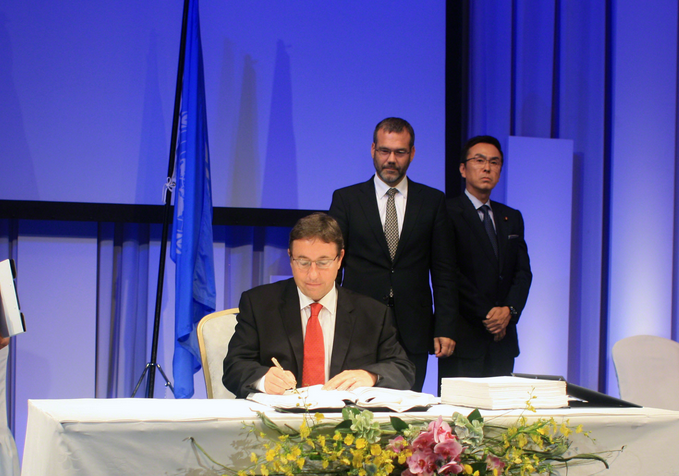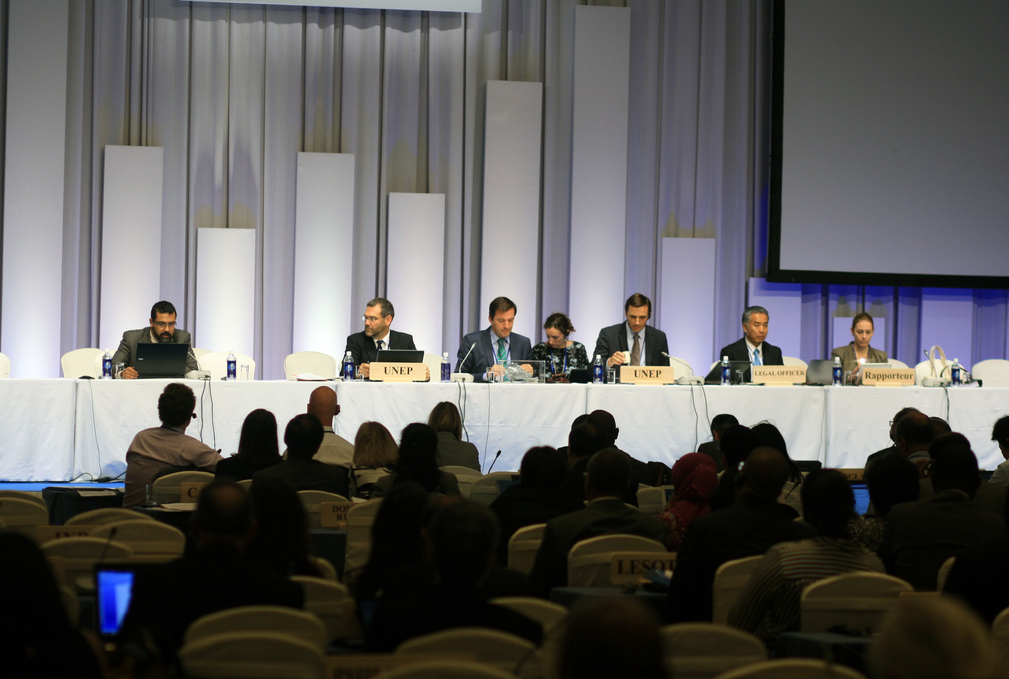Minamata Convention on mercury damage prevention adopted in Japan
An international conference organized by the U.N. Environment Program adopted a historic treaty named “Minamata Convention on Mercury” in Japan on Thursday 10 october, aiming at regulate the use and trade of mercury.
The treaty maps out measures to curb health and environmental damage caused by mercury, which will take effect 90 days after ratification by 50 nations. Its name came after a Japanese city where industrial emissions of the toxic substance caused a poisoning disease that affected thousands of people.
More than 1,000 delegates from about 140 nations participated in the conference held in KumamotoCity in southwestern Japan.
Signature of the Final Act and the Convention:
At 3:25 pm, both the Final Act and the Convention were opened for signature. The following 86 countries and the European Union signed the Convention: Argentina, Armenia, Australia, Austria, Bangladesh, Belgium, Benin, Bolivia, Brazil, Bulgaria, Burkina Faso, Cambodia, Canada, Central African Republic, Chile, China, Colombia, Comoros, Costa Rica, Côte d’Ivoire, Czech Republic, Denmark, Djibouti, Dominican Republic, Ecuador, Ethiopia, Finland, France, Gambia, Georgia, Germany, Greece, Guatemala, Guyana, Hungary, Indonesia, Iraq, Ireland, Islamic Republic of Iran, Israel, Italy, Jamaica, Japan, Jordan, Kenya, Kuwait, Libya, Lithuania, Luxembourg, Madagascar, Malawi, Mali, Mauritius, Mexico, Mongolia, Mozambique, Nepal, Netherlands, New Zealand, Nicaragua, Niger, Nigeria, Norway, Pakistan, Panama, Peru, Philippines, Republic of Moldova, Romania, Samoa, Singapore, Slovakia, Slovenia, South Africa, Spain, Sweden, Switzerland, Togo, Tunisia, Uganda, United Arab Emirates, United Kingdom, United Republic of Tanzania, Uruguay, Venezuela, and Zambia.
The following 23 countries signed only the Final Act: Afghanistan, Angola, Azerbaijan, Botswana, Cameroon, Congo, Gabon, Guinea, Kiribati, Lebanon, Lesotho, Mauritania, Morocco, Paraguay, Republic of Korea, Russian Federation, Senegal, Sierra Leone, South Sudan, Suriname, Uzbekistan, Yemen and Zimbabwe.

UNEP Executive Director Achim Steiner, Executive Secretary of the Plenipotentiary Conference, signed the Final Act.
“Each party shall not allow, by taking appropriate measures, the manufacture, import or export of mercury-added products” after the phase-out date of 2020, says the text, referring to a list of products such as fluorescent lamps that contain a certain level of mercury.
The treaty also says “each party shall not allow the export of mercury except” for uses specified under the convention.
It seeks to decrease the discharge of mercury into the air, water and land, to promote proper storage and disposal of mercury, as well as reduce the use and discharge of mercury in the process of gold mining in developing countries.
The pact, which is expected to take effect in 2016 at the earliest, also calls for a ban by 2018 on the use of mercury in the process of producing acetaldehyde, the cause of Minamata disease.
It will also provide financial aid through a fund to developing countries to assist their efforts to cut mercury emissions, but does not refer to issues such as compensation for victims and who should be obliged to restore mercury-contaminated environments.
The treaty will ban mining of fresh mercury and only allow “primary mercury mining that was being conducted within its (party’s) territory at the date of entry into force of the Convention for it for a period of up to 15 years after that date.”
“The people have taken a stand to reduce the risks of mercury to the fullest extent possible,” Japanese Environment Minister Nobuteru Ishihara told reporters after the treaty was adopted, urging all nations to ratify the pact.
The convention will take effect 90 days after 50 countries and territories have ratified it. The Environment Ministry will contribute about $1 million (approximately ¥100 million) to such international organizations as the U.N. Environment Program.






